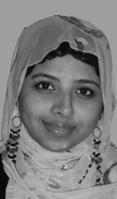On April 18, the World Culture Week sponsored a panel discussion labeled “Engaging Islam: Perception and Experience.” The purpose of this panel discussion was mainly to highlight the upcoming conference, “Engaging Islam: Feminisms, Religiosities and Self Determination” being held Sept. 12-15. However, some interesting discussions and topics arose from the symposium.
The main topics of the panel included “Reality at the West Bank” and the growing need to understand the Middle East, identity issues outside of the Middle East, gender issues in Islam and the Hijaab, and misconceptions about the Quran and the Muslims today. Four student panelists spoke about these issues and one controversial issue emerged before the questions-and-answers session began.
One of the keynote speakers at the conference in September is Amina Wadud. She is an associate professor of Islamic Studies at the University of Michigan, and also the first woman in history to lead the Muslim Friday prayer. The prayers are normally always lead by men. This was controversial amongst Muslims and non-Muslims alike because some argue that it was against the teachings of Islam, while others applaud her actions.
Islam is not just a religion, but also a complete way of life. Half of Islam is following the teachings of the Quran, and the other half is following the life examples of the Prophet Muhammad (peace be upon him). Islam emphasizes women’s rights by being the first religion to grant it to them. It encourages women to get educated, grants rights of inheritance, ownership and so forth. It also emphasizes equality between men and women; men and women have different roles in societies based on their biological differences, but both their duties are equal in their status. Men should work and provide for the family while the woman should nurture the children. Women are not prohibited from working but they should not be required or pressured to do so. Muslim women also wear hijaab (modest clothing and the head covering) to be liberated from the pressures of the society to be materialistic and beautiful. Though Muslim prayer requires women to stand in front of men and to bend and prostrate, it was not taught by the Prophet or practiced by the women in his time. Muslims women, however, are not prohibited from leading prayer among other women.
One of the reasons Wadud led the Friday prayer was to make a statement about equality of women. What disturbed me most was that a woman is not made inferior praying separately or behind a man. Her prayer and the one of the man standing in front of her will account for exactly the same reward; men and women have different roles in society that are equal in their final contribution and status. Something that was not practiced by the Prophet and is not in the teachings of the Quran is biddah, innovation-addition/removal of an Islamic teaching. This is not a part of Islam.
The professors at the panel coordinating the upcoming conference encouraged students to come to the conference and discuss these issues with the speakers present. They encourage a dialogue between the UMass Boston’s Muslim students and Wadud on this matter.
Sarah Ahmad is vice president of the Muslim Students Association at UMass Boston.





















































